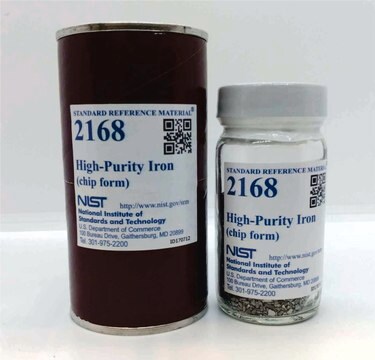About This Item
Recommended Products
Assay
≥99.99% trace metals basis
form
flakes
resistivity
9.71 μΩ-cm
diam. × thickness
<25 mm × 4-6 mm
bp
2750 °C (lit.)
mp
1535 °C (lit.)
density
7.86 g/mL at 25 °C (lit.)
SMILES string
[Fe]
InChI
1S/Fe
InChI key
XEEYBQQBJWHFJM-UHFFFAOYSA-N
Storage Class Code
4.1B - Flammable solid hazardous materials
WGK
nwg
Flash Point(F)
Not applicable
Flash Point(C)
Not applicable
Choose from one of the most recent versions:
Already Own This Product?
Find documentation for the products that you have recently purchased in the Document Library.
Customers Also Viewed
Articles
Mechanical alloying is a “brute force” method of affecting alloying and chemical reactions. The mixture of reactant powders and several balls are placed in the milling jar of a high-energy ball mill, for example, a shaker mill or a planetary mill.
The price of tellurium, a key component in many thermoelectric materials, has risen in recent years, leading to the search for more cost-effective substitutes. This article presents silicide materials as a cheaper potential alternative.
Higher transition metal silicides are very well-suited for anisotropic thermoelectric conversion. Essential anisotropy of the Seebeck coefficient, together with good mechanical properties, allows production of reliable anisotropic thermoelectric converters.
Our team of scientists has experience in all areas of research including Life Science, Material Science, Chemical Synthesis, Chromatography, Analytical and many others.
Contact Technical Service




